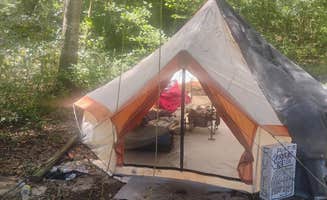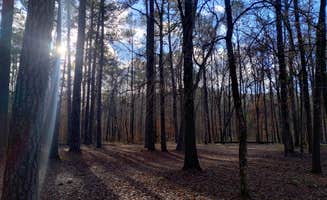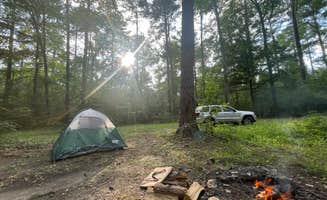Dispersed camping areas near Williamson, Georgia offer primitive camping experiences on public lands within the Piedmont region. These sites sit at elevations between 600-800 feet, contributing to mild spring and fall temperatures typically ranging from 50-80°F. Most sites require navigation via forest service roads, with seasonal closures possible during winter months or after heavy rainfall events.
What to do
Hiking opportunities: At Tyler Hunt Camp, visitors can access several unmarked trails. "It's quiet, super dark at night and beautiful. No amenities, you pack it in, you pack it out," notes camper LeeAnne T. The surrounding forest provides ample space for off-trail exploration.
Wildlife viewing: Morning and evening hours offer optimal wildlife viewing. "Saw some deer and a mystery black animal, maybe a boar or a bear - unsure," reports SJ W. from their experience at Ocmulgee River Camp. Bring binoculars for distant sightings and maintain appropriate distance from wildlife.
Seasonal hunting: Hunting remains the primary activity in many Wildlife Management Areas. Campers should check Georgia Department of Natural Resources regulations before visiting. One visitor to Rum Creek WMA notes, "Must have a hunting or fishing license or a land use pass." Non-hunters should be aware of hunting seasons and wear high-visibility clothing when appropriate.
What campers like
Dark night skies: The minimal light pollution creates excellent stargazing opportunities. As LeeAnne T. experienced at Tyler Hunt Camp, "It's quiet, super dark at night and beautiful." The lack of ambient light allows for exceptional constellation viewing, particularly during clear winter nights.
Open camping spaces: Most sites offer flexible setup areas. "Open spaces and very quiet this time of the year (January)," reports Greg D. about his stay at Ocmulgee River Camp. Another visitor noted, "Beautiful campsite, just a few neighbors, tons of flat space and a few fire pits."
Solitude during weekdays: Weekday camping typically provides quieter experiences with fewer neighbors. "Very nice a bit bumpy on the drive in but no major holes. Quiet and peaceful 2 neighbors great amount of space to find a nice spot," shares J A. about their Ocmulgee River Camp experience.
What you should know
License requirements: Several Wildlife Management Areas require documentation. At Joe Kurz Wildlife Management Area, campers need "a valid Georgia hunting or fishing license to camp," according to Lonnie B., who adds this reflects "the area's primary use for hunting and fishing activities."
Cell service limitations: Connectivity varies significantly by location and carrier. "No cell coverage, has fire pit, mostly tent and car campers," reports Lenear B. about Joe Kurz WMA. However, at Ocmulgee River Camp, one camper notes Verizon service "works perfectly."
Site security considerations: Some locations experience varied traffic patterns after dark. Micah C. shares about Tyler Hunt Camp, "I enjoyed my stay here during the day, but things changed after dark... As night fell, I began preparing for bed, but I noticed vehicles coming and going." Another camper mentions routine ranger checks, noting, "Expect to have a drive thru at least once around 9/10. It's just a see who is in the area type thing."
Tips for camping with families
Weather preparation: Seasonal temperature variations affect comfort levels. "It was nice and warm even in December! Almost 70 degrees!" notes SJ W. about Ocmulgee River Camp, adding it was "a little buggy since it was humid and by the river but not too bad." Bring appropriate clothing layers and insect protection.
Noise expectations: Natural and human-made sounds are common in these areas. Greg D. observed at Ocmulgee River Camp, "train horn in the distance and gunshots in the distance as well from hunters here and there but all around a great spot to really enjoy."
Road conditions: Access roads to primitive camping areas vary in quality. Michael S. describes Ocmulgee River Camp as "only a mile off the road, which is a little bumpy but manageable." Vehicles with low clearance may struggle on some access routes, particularly after rainfall.
Tips from RVers
Site selection: RV campers should scout locations before setup. Lenear B. from Joe Kurz WMA notes, "mostly tent and car campers. I went with a travel trailer." RVs typically need to select flatter areas away from low-hanging branches.
Self-sufficiency requirements: No hookups or services are available at any of the primitive camping areas. Bring sufficient water, manage waste appropriately, and prepare for no dump stations. Generator use policies vary by location, with some areas restricting hours or prohibiting use entirely.
Road navigation challenges: Forest roads may present obstacles for larger RVs. "Nice open camp site with plenty of spots for camping," reports Michael S. about Ocmulgee, though noting the access road is "a little bumpy but manageable." Full-size RVs should research specific access conditions before arrival.




